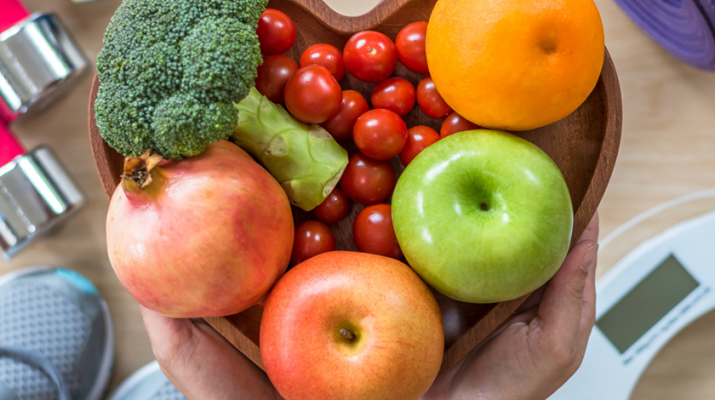By Deborah Jeanne Sergeant
While the phrase “super foods” may create buzz around fad foods, it’s true that eating a healthful diet can help support healthy aging. Area experts share their advice for eating right.
Here’s what they say:
• I am a strong proponent of the transformative power of whole, and unrefined or minimally refined plant foods, like berries, bananas, broccoli, cauliflower, lettuce, squash, corn and potatoes.
• Eat whole grains like brown rice, and legumes — like black beans, chickpeas. Vegetables are an important part, but that’s not all that it is. There are starches: potatoes, sweet potatoes, quinoa and chickpeas.
• In moderation, eat the nuts, seeds, tofu, whole grain flour and plant-based milk.
• Look at the top two causes of death, according to the CDC: heart disease and cancer. There is a solid body of evidence around the different kinds of diet that reduces risk of heart disease and cancer. The big contributors are hypertension and diabetes. A low-salt diet has been proven to reduce blood pressure. Reducing processed foods and refined sugar controls diabetes and has also been shown to reduce the risk of cancer. Use the My Plate by USDA.
• Drink no or very minimal beverages with sugar added.
Physician Chanh Huynh, Churchville-Chili Family Medicine LLC, North Chili.

• Consume a solid source of collagen. A lot of companies have come out with flavored collagen or things easy to mix into things like water. A traditional approach is to take the carcass of a turkey or chicken — organic, free range — to make a bone broth. You’ll extract the nutrients from the marrow.
• Anything you can do to reduce inflammation is important. Heart disease, cancer and diabetes: these are fundamentally inflammatory. Vitamin C is a potent anti-inflammatory. If you use a supplement, go for a whole-food oriented supplement.
• Your immune system starts to progressively dwindle as you age. We want to make sure our bodies are responding appropriately to stave off infection. A lot of dark, leafy greens supply a good amount of Vitamin C.
• Make sure you focus on calcium. A lot of people focus on dairy, which is OK, but it’s not bio-available. Make sure you’re doing the dark, leafy greens, which provides the body of a lot more available sources of calcium than you would expect. There’s a plethora of benefits about detoxifying the liver and clearing the kidneys. You can cook them down and still get a lot of the benefits. Steaming is best to preserve nutrient density. Or a powdered form of something as a last resort. You can mix it into a smoothie.
• If you’re going to do anything in terms of dairy, you’ve got to make sure it’s a cultured form of dairy like cottage cheese, kefir or a quality, plain whole milk yogurt. Stay away from the low-fat, no-fat or full of sugar yogurt. A lot of nutrients are absorbed in the presence of fat.
Matt Boheen, doctor of chiropractic, founder of Restoration Wellness, Rochester.
• Make sure more of your fruits and vegetables are raw or lightly cooked. They don’t boil things into oblivion. Or use the water to make a soup out of it.
• Do not over-eat to the point where you’re uncomfortably full. Caloric restriction is a way to increase lifespan.
• Meat should be like a treat or garnish for a meal that is in limited quantities. You don’t have to become a vegan but limit meat, especially red meat. Have a day where you don’t have any meat or use it as a flavoring.
• Refined carbs and sugar are a detriment to our health.
• Green tea, berries, onions, garlic, mushrooms are things that are definitely good for longevity. These combat the signs of aging and help get rid of toxins. They’re full of antioxidants.
Heather Carrera, doctor of clinical nutrition and a certified nutrition specialist at the office of Dr. Leslie James, Pittsford.

• Get a minimum of two liters a day for women and three liters a day for men of water. Drink more if you’re at all active. Hydration helps your overall health and helps you look more youthful. It puts less stress on your organs. Consult your health care provider if you have to watch fluid intake.
• The biggest thing is to choose whole foods that aren’t processed and don’t have a lot of chemicals.
• Choose healthier fats, like nuts, avocado, stay away from saturated fat which causes inflammatory which increases stressors in the body.
• With carbohydrates, choose whole grains, like whole wheat bread and cereal and make sure you’re getting many fruits and vegetables. For a more healthier option, you may consider ordering organic vegetables from an organic vegetable CSA delivery service.
• Don’t over-consumer alcohol, which can stress the body. It increases the rate of aging and cancer. It also contains extra calories. There’s a direct correlation between the amount of alcohol consumed and risk of cancers such as colon and liver cancer.
Hannah C. Smith, registered dietitian nutritionist and manager of clinical nutrition for Rochester Regional Health.

